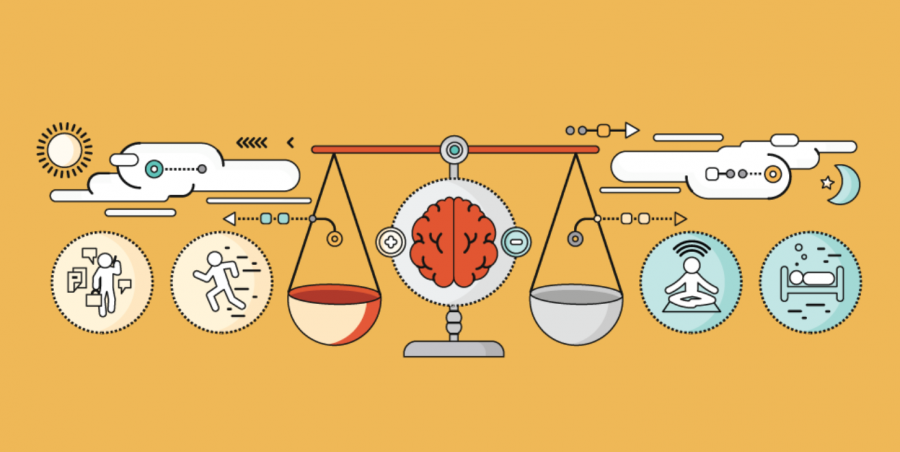Viewpoint: How college students can easily improve their health
October 26, 2018
At the University of Wisconsin – La Crosse and colleges all over the country, October means midterms. And midterms mean lots of studying, lots of coffee and little sleep. As the peak of fall approaches, students often find themselves stressed about classes as well as personal goals. During this stressful time, health habits take a second seat to education.
The choices that we make now can have negative effects on our bodies in the future. For instance, many people that eat unhealthy in their younger years have a higher risk for obesity and type two diabetes (NCBI). Fear not, a healthy lifestyle does not have to be a burden. There are a couple quick and easy changes that can benefit a person’s overall health.
Exercise is one of the main factors in maintaining a healthy lifestyle and one of the easiest things to dismiss. Exercise may seem like another task, but it can actually be fun when you are strengthening mindful techniques. In La Crosse, there are multiple options for exercise on, or off campus.
Off campus, students can hike the bluffs or rollerblade downtown. On campus, the Recreational Eagle Center offers an array of group fitness classes with a three dollar drop in fee, or 20 dollars for the rest of the semester (uwlax.edu).
If group fitness classes are not within your interests, you can check out the new REC 2.0, which is offering “enlarged strength training space, large multipurpose recreation rooms” (uwlax.edu)
Intramural sports season may seem like it is winding down for the semester, but rest assured, there is a second quarter of intramural registering that includes bag toss, 4’s volleyball, 5v5 basketball, dodgeball, and more! (uwlax.edu)
For the more adventures, the climbing wall is open 5p.m. to 9p.m. Monday through Friday, 3p.m. to 6p.m. on Saturday, and 5p.m. to 8p.m. on Sunday. There are many introductory climbing classes students, and the UWL public can take to introduce themselves of new forms of exercise (uwlax.edu).
As long as students are maintaining 150 minutes of exercise a week, they can maintain a healthy lifestyle which will not only improve their academic well-being but enhance their social and cognitive processing (AHA). Although, exercise is not the only thing a student can do to maintain a healthy life style. Eating healthy can provide the energy needed to make it through the week.
Fruits and vegetables are not the most favorite food to eat and according to the American College Health Association, “only 7.3% of students ate five or more serving of fruits and vegetables daily.” There are so many unique ways to eat vegetables and fruits that a simple recipe can change the amount we consume in a day.
In the morning for breakfast, smoothies are a simple and easy meal that will fill you up for the day and help prepare you for classes. Try the “strawberry swing” for example, you only need eight frozen strawberries, a half of cup of plain yogurt and a half of cup of shredded unsweetened coconut. For something a spicier in the morning to wake you up, try “channel orange,” it consists of one red bell pepper, one peeled navel orange and one tablespoon of coconut oil (Buzzfeed).
Drinking water is an extremely underrated quality of a well-balanced diet. Many people don’t realize what the presence of water can do to your system, by just drinking water you will be healthier, have clearer skin and more energy.
The New York Times quoted, “I must convince more of you that remaining well hydrated is crucial to your health. However solid your body, the majority of it is water, ranging from 75 percent of the body weight of infants to 55 percent of the elderly. Every bodily process, every living cell, depends on water to function properly. Water transports nutrients, regulates body temperature, lubricates joints and internal organs, supports the structure of cells and tissues and preserves cardiovascular function. People can survive for only three or four days — a week at most — without water.”
Maintaining a healthy lifestyle incorporates socialization. A simple 10-minute conversation with a friend can help break the tension of school. The Mental Health Foundation claimed, “Friendship is a crucial element in protecting our mental health. We need to talk to our friends and we want to listen when our friends want to talk to us. Our friends can keep us grounded and can help us get things in perspective. It is worth putting effort into maintaining our friendships and making new friends. Friends form one of the foundations of our ability to cope with the problems that life throws at us.” Friendship encourages us to maintain our goals and debrief about feelings, actions, or anything else we want someone to listen to.
It is vital that students do not burn themselves out from the stress of school and continue to be overworked and overwhelmed. College sets students up for the rest of their lives, so taking measures to ensure a healthy lifestyle now, can create a healthy life after college.






